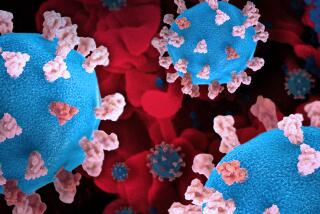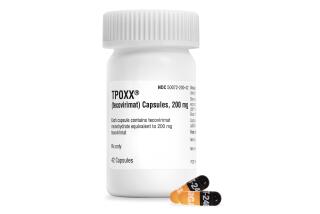Oral Drug Found Promising as Possible Smallpox Treatment
- Share via
Scientists have developed a drug that could be a useful treatment in the event of a bioterrorist attack with the deadly smallpox virus.
The drug, which has been tested against smallpox in cell cultures or on related viruses in animals, can be administered by mouth--an important attribute for a medicine that might have to be given to many people quickly.
The findings, which have not yet been published, were presented Tuesday at a conference in Prague in the Czech Republic. Bioterrorism experts said the drug could be an important step in developing a protective arsenal against smallpox. Such drugs, by interfering with the virus’ ability to replicate, would allow victims to survive the disease.
Extinct in nature, the virus still remains in two known repositories--in the United States and Russia. U.S. intelligence officials believe smallpox stocks may also exist at other sites from which they theoretically could be used in a hostile attack.
But the experts stressed that the drug faces many more tests before its safety and effectiveness against smallpox infections are known. In addition, they said, a safer vaccine and a better variety of drugs are needed.
The work is the result of a collaboration between scientists in California, Maryland, Atlanta and Alabama.
The drug was created after government scientists screened hundreds of drugs in search of one able to interfere with the way the smallpox virus reproduces when grown in a cell culture.
The scientists found several candidates, including one--called cidofovir--which is used to treat certain viral eye infections. That drug, however, must be injected to be effective.
Dr. Karl Hostetler and James Beadle, scientists with the Veterans Affairs San Diego Healthcare System and UC San Diego, chemically modified cidofovir so that it could easily be absorbed by the human gut and thus could be taken orally.
That modified chemical slows the ability of smallpox to reproduce in a cell culture when given at a far lower dose than that of unmodified cidofovir, said John Huggins, chief of the department of viral therapeutics at the U.S. Army Medical Research Institute of Infectious Diseases in Ft. Detrick, Md.
The drug also protected mice from cowpox--an infection related to smallpox that is deadly to mice--when it was given to the animals orally at the same time they were infected, Huggins said.
Scientists are developing a vaccine against smallpox that would have fewer side effects than the current injection. Public health officials say that is key to protecting against a potential smallpox outbreak. Effective drugs that could slow infection are important too, said David Sherman, professor of microbiology at the University of Minnesota Medical School in Minneapolis.
“Maybe a vaccine developed against one form of the virus might not protect against a new form or a diabolically altered form,” Sherman said.
But developing anti-smallpox drugs is a difficult proposition, said Jonathan B. Tucker, a specialist in chemical and biological weapons with the Monterey Institute of International Studies and author of “Scourge: The Once and Future Threat of Smallpox.”
“It’s the whole dilemma of trying to develop treatments for a disease that no longer exists in nature,” he said.
Since smallpox virus does not normally cause disease except in humans, tests are done with related viruses. These may react somewhat differently to the drugs than would the smallpox virus.
In addition, said Tucker, it is important that the drug be able to fight the virus after the subject is infected. Such tests are planned on mice, Huggins said.
The scientists also hope to test the drug’s safety in animals and then people--as well as its effectiveness in treating eye infections that are treated with the injectable version of the drug.
Smallpox is caused by the variola virus, which induces flu-like symptoms and a characteristic rash..






